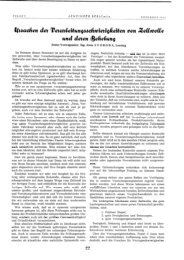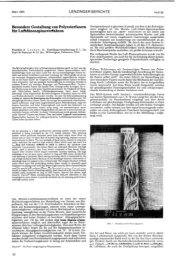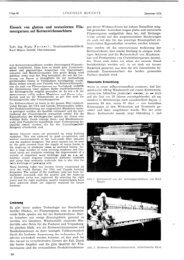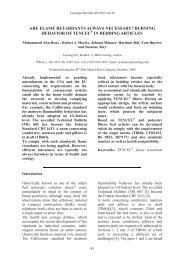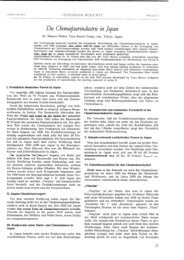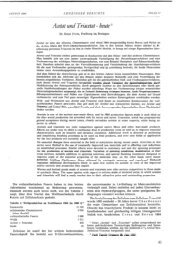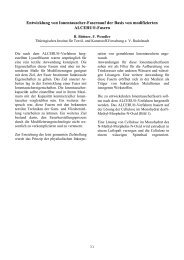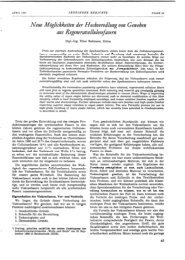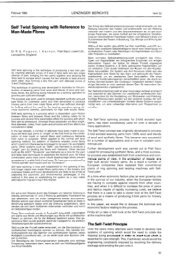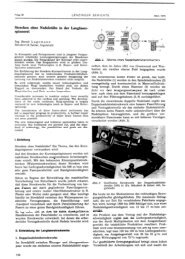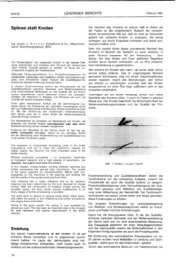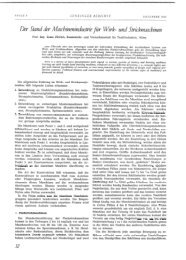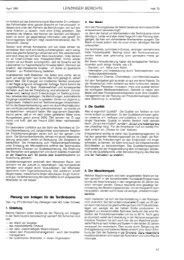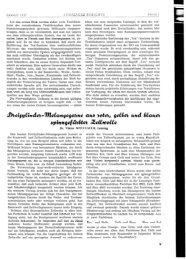Erfolgreiche ePaper selbst erstellen
Machen Sie aus Ihren PDF Publikationen ein blätterbares Flipbook mit unserer einzigartigen Google optimierten e-Paper Software.
32 Sappi<br />
The company Sappi (see page 33) was created because, after<br />
WW1, Pretoria planned to stop the South African union’s dependence<br />
on wood imports on the one hand, and to allow private<br />
companies to implement this strategic decision on the other.<br />
In order to ensure sustainability, the companies were given<br />
huge areas of land. This is why Sappi still has 540,000 hectares<br />
of land on which 6.4 million tons of wood are produced every<br />
year. An eucalyptus or pine tree grows quickly and can be<br />
processed for paper after a mere 7 to 15 years.<br />
Decades before conservationists began warning of the consequences<br />
of the systematic deforestation of indigenous forests<br />
worldwide, it was already known in sparsely wooded South Africa<br />
that over-exploitation offered few prospects for the future. It is<br />
fitting, therefore, that in recent years since democratization of the<br />
Cape, Sappi has successfully introduced "Project Grow". The<br />
growth project is also oriented towards sustainability: 10,000<br />
farmers have not only received free seeds, but also accurate management<br />
programs and advances, to guarantee wood production<br />
for 20 years. "We are not using foreign materials, nor are we<br />
touching indigenous forests and wood types", emphasized Mark<br />
Albon, Sappi spokesman for wood cultivation in Kwazulu-Natal.<br />
Not least, Sappi has fulfilled the requirements of the Genevabased<br />
International Organization for Standardization – both in<br />
relation to the environment (ISO 14001), and health and safety<br />
(ISO 18000) – and is now a global leader in the area of sustainable<br />
forestation.<br />
Albon admits that conservation groups are warning about reforestation<br />
of grassland – which makes up a quarter of the land in<br />
South Africa – as the rapidly growing trees require too much ground<br />
Alan Tubb is Managing<br />
Director of Sappi<br />
Saiccor, the world's<br />
largest manufacturer<br />
of dissolving pulp.<br />
Alan Tubb ist<br />
Geschäftsführer<br />
von Sappi Saiccor,<br />
dem weltweit größten<br />
Cellulose-Hersteller.<br />
Sappi Saiccor was the first mill to produce dissolving pulp from Eucalyptus.<br />
Sappi Saiccor war der erste Hersteller von Cellulose aus Eukalyptusbä<strong>um</strong>en.<br />
Land, auf denen jährlich 6,4 Millionen Tonnen Holz produziert<br />
werden. Ein Eukalyptusba<strong>um</strong> oder eine Kiefer wächst schnell<br />
und kann nach 7 bis 15 Jahren zu Papier verarbeitet werden.<br />
Jahrzehnte bevor Umweltschützer begannen, weltweit vor dem<br />
systematischen Abholzen einheimischer Wälder zu warnen, hatte<br />
man im waldarmen Südafrika zudem erkannt, dass Raubbau<br />
eine zukunftslose Perspektive darstellt. Dazu passt, dass Sappi<br />
in den letzten Jahren, seit der Demokratieerlangung am Kap,<br />
erfolgreich das „Project Grow“ eingeführt hat. Das Wachst<strong>um</strong>sprojekt<br />
ist ebenfalls auf Nachhaltigkeit orientiert: 10.000 Bauern<br />
haben nicht nur kostenlos Setzlinge erhalten, sondern auch<br />
exakte Managementprogramme und Vorschüsse, <strong>um</strong> <strong>die</strong> Holzproduktion<br />
auf 20 Jahre zu gewährleisten. „Wir benutzen weder<br />
ausländisches Material, noch werden einheimische Wälder<br />
und Holzarten angetastet“, unterstreicht Mark Albon, der Sappi-Kommunikationschef<br />
für Holzanbau in Kwazulu-Natal.<br />
Nicht zuletzt deshalb hat Sappi <strong>die</strong> Anforderungen der Genfer<br />
Normungsgemeinschaft „International Organization for Standardization“<br />
erfüllt – sowohl was <strong>die</strong> Umwelt (ISO 14001) als auch<br />
was <strong>die</strong> Sicherheit und Gesundheit (ISO 18000) betrifft – und gilt<br />
heute als weltweit führendes Unternehmen auf dem Gebiet der<br />
nachhaltigen Aufforstung.<br />
Albon rä<strong>um</strong>t ein, dass Umweltgruppen davor warnen, auf<br />
Grasland – das ein Viertel der Gesamtfläche Südafrikas ausmacht<br />
– neue Aufforstungen zu betreiben, da <strong>die</strong> schnell wachsenden<br />
Bä<strong>um</strong>e zu viel Grundwasser benötigen. Sappi benutze heute<br />
nur noch drei Prozent der Originalfläche des Graslands (33,4<br />
Mio. Hektar) und fast <strong>die</strong> Hälfte <strong>die</strong>ser dreiprozentigen Fläche erhole<br />
sich nun wieder als Ernteboden, hauptsächlich für Mais-



